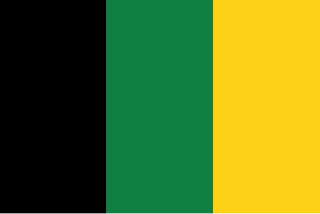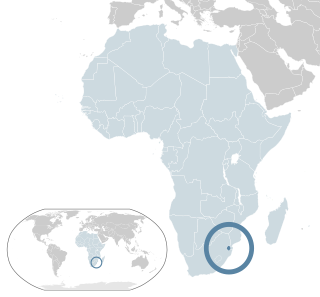
Eswatini, formally the Kingdom of Eswatini and also known by its former official name Swaziland and formerly the Kingdom of Swaziland, is a landlocked country in Southern Africa. It is bordered by Mozambique to its northeast and South Africa to its north, west, south, and southeast. At no more than 200 km (120 mi) north to south and 130 km (81 mi) east to west, Eswatini is one of the smallest countries in Africa; despite this, its climate and topography are diverse, ranging from a cool and mountainous highveld to a hot and dry lowveld.
The Umbutfo Eswatini Defence Force (UEDF) is the military of the Southern African Kingdom of Eswatini (Swaziland). It is used primarily during domestic protests, with some border and customs duties; the force has never been involved in a foreign conflict. The army has struggled with high rates of HIV infection. Since measures were put in place the rate is dropping.

Mswati III is Ngwenyama (King) of Eswatini and head of the Swazi royal family. He heads Africa’s last absolute monarchy, as he has veto power over all branches of government and is constitutionally immune from prosecution.

The Parliament of Eswatini is bicameral, consisting of a lower chamber and an upper one. Some of the members of both chambers are elected, while the rest are appointed by the King of Eswatini. Election is by secret ballot in a first-past-the-post system of voting. Members of both chambers serve for five-year terms. All candidates run on a non-partisan basis, as political parties are banned.

The Ngwane National Liberatory Congress (NNLC) is a political party in Eswatini. It was founded on 12 April 1963 as a breakaway party from the Swaziland Progressive Party (SPP) led by Dr. J. J. Nquku.

Lobamba is a city in Eswatini, and is one of the two capitals, serving as the legislative, traditional, spiritual, seat of government of the Parliament of Eswatini, and Ludzidzini Royal Village, the residence of Queen Ntfombi, the Queen Mother.

The House of Assembly of Eswatini is the lower chamber of the country's bicameral Parliament. The Assembly may debate and pass bills, although as the country is an absolute monarchy, the role of the legislature is mostly advisory.

The Senate of Eswatini is the upper chamber of the country's bicameral Parliament. The Senate may debate or pass a bill, with the exception of a "money bill", which must first be introduced in the lower chamber, the House of Assembly.

iNgwenyama is the title of the male monarch of Eswatini. In English, the title is sometimes translated as King of Eswatini. The iNgwenyama reigns together with the Ndlovukazi, a spiritual leadership position held by the iNgwenyama's mother or another female royal of high status.

Lesbian, gay, bisexual, and transgender (LGBT) people in Eswatini have limited legal rights. According to Rock of Hope, a Swati LGBT advocacy group, "there is no legislation recognising LGBTIs or protecting the right to a non-heterosexual orientation and gender identity and as a result [LGBT people] cannot be open about their orientation or gender identity for fear of rejection and discrimination." Homosexuality is illegal in Eswatini, though this law is in practice unenforced. According to the 2021 Human Rights Practices Report from the US Department of State, "there has never been an arrest or prosecution for consensual same-sex conduct."
HIV/AIDS in Eswatini was first reported in 1986 but has since reached epidemic proportions. As of 2016, Eswatini had the highest prevalence of HIV among adults aged 15 to 49 in the world (27.2%).

Prince Guduza Dlamini is the Speaker of the House of Assembly of Swaziland from December 2006 to June 2013. He is a member of the House of Dlamini and the brother of Mswati III of Eswatini. He was a member of the Senate of Swaziland from 1993 to 2003. He held several ministerial portfolios during that time. These include minister of home affairs in 1998, minister of natural resources and energy from 1998 to 2001 and minister of economic planning and development from 2001 to 2003.

Government of the Kingdom of Eswatini is the union government created by the constitution of Eswatini where the monarch holds supreme executive, legislative, and judicial powers. The Ngwenyama (lion) is a hereditary leader, rules the country, with the assistance of a council of ministers and a national legislature.
Lindiwe Dlamini is a politician from Eswatini who is serving as President of the Senate of Eswatini. She also served as Minister of Public Works and Transport.
Petros Mavimbela is a politician from Eswatini who is serving as Speaker of the House of Assembly from October 2018 and Eswatini Branch President of Commonwealth Parliamentary Association.
The Legislative Council of Swaziland was the legislative body of Swaziland Protectorate from 1964 to 1967.
Chief Gelane Zwane is a politician from Eswatini.
This page is based on this
Wikipedia article Text is available under the
CC BY-SA 4.0 license; additional terms may apply.
Images, videos and audio are available under their respective licenses.







